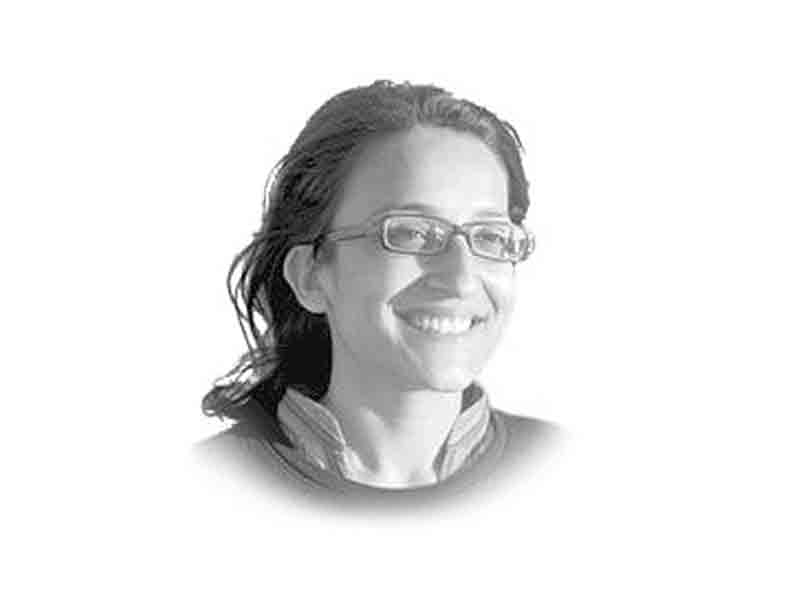
It started as a game but as they grow, I keep them familiar with the words of the day, like ‘violence’, ‘multiply’, ‘terrorism’, ‘dictatorship’, ‘soil erosion’, ‘secularism’ or ‘water kit’. Language is fluid; I do not wish them to ever be swept away by the powerful current of loaded words so I try to teach them to approach life itself from a solid foundation, a foundation of knowledge, so they can place meaning in context instead of in stone. If, one day, someone says to my children ‘jump’, I want them to ask ‘but why’ and not ‘how high?’
This approach is an inherently risky one. If you arm your child with knowledge, rationality follows, and you are the first person he or she will use it against. Hence, situations like my little one responding to my cooking by ‘going on strike for better eating conditions’, or my older one denying my request to turn his ulta chappal back the right way with ‘just because you’re superstitious doesn’t mean you have to try to make me superstitious too’.
‘Why is she going on about her children,’ you might ask. ‘I have a clever little anecdote about the time my car drove itself to the mechanic but you don’t see me cluttering up column space about it.’ I write about these things now because over the last two weeks, we have seen an unprecedented number of women, with their children in tow, come out on the streets, and funnily enough, you never see them come out in op-ed pages. A lot of columnists write ‘when I was in the army’ or ‘when I was in the foreign service’ or ‘when I was in the MRD’. Nobody ever writes ‘when I was in labour’.
Greater diversity of subject is not the only thing we could gain by making more space in public discourse for women. We’d also move closer to the feminine, compassionate, healing use of language women have perfected through centuries of being caregivers (its counterpoint is Mubashir Lucman’s abusive bombast). We see some of it already — the nuance and tone of Najam Sethi’s Aapas ki baat, in which Sethi Saab and his sidekick talk about the issues of the day with warmth, wit and a cup of tea, is an example of how mature, witty, warm women speak to each other over a cup of tea, honest. Another example? Hina Rabbani Khar’s articulate, dignified, goal-driven performance with Christiane Amanpour the other day. This might seem like the simplification of a complex truth. It is. The truth, as every child knows, is that human beings feel less depressed, insecure and anxious about life when those who seem to influence theirs are calm and focussed rather than loud and aggressive.
We can keep elements of the juvenile though: Tahirul Qadri calling politicians Yazidi, Maulana Fazlur Rehman referring to Tahirul Qadri as Musalmanon ka J Salik, Information Minister Qamar Zaman Kaira saying of Qadri Yeh reformer nahin performer hai, Tahirul Qadri referring to Rehman Malik as Shaitan Malik and Rehman Malik saying that Qadri acts like a ‘semi-pope’ and dresses like a ‘Jewish pastor’. In the new democracy that is Pakistan, we are all toddlers and we can take these utterances as our siyasat/riyasat parents tickling our armpits.
Speaking of the need to champion advocates of the feminine, compassionate, healing use of language, how ironic it is that the Supreme Court has just admitted a petition against Sherry Rehman. For blasphemy.
Published in The Express Tribune, January 24th, 2013.
COMMENTS (11)
Comments are moderated and generally will be posted if they are on-topic and not abusive.
For more information, please see our Comments FAQ


1719660634-1/BeFunky-collage-nicole-(1)1719660634-1-165x106.webp)

1732276540-0/kim-(10)1732276540-0-165x106.webp)







Wholesome giddiness of running the rule over readily farcical indigenous semantics aside, I'd wager the writer's next publication is about her kids.
Brilliant.
Dear Author,
Not having had parents like you, I am not equipped with the right words to explain my feelings. Amazing, eye opening, enlighteneing etc come to my mind, but my heart tells me these words do not do justice to what I feel.
The truth, as every child knows, is that human beings feel less depressed, insecure and anxious about life when those who seem to influence theirs are calm and focussed rather than loud and aggressive.
This gem is my take home for the day.
Thank You.
Very well said, Madam!
May every child in Pakistan have a mother like you. Amen!
Nothing better than an educated mother. I would suggest to make it full 6 points by adding proper religious education too. So that ignorant and misguided "religious teachers" of every shade can not destroy the young people as now.
well this is a real column, made me think and made me smile! thanx. totally loved it.
Well said. The saas bahu jhamelas and the women stereotype centric dramas on tv portraying woman as woman's worst dushman, education for women is only right when they are poor and mistreated otherwise women use education as a way to become 'westernized' (implying corrupt morals), etc. women writers and women directors and women producers need to come and women need to find their voice and use words with care to portray nuances, context, the gray matter (as opposed to stark black and white), the diversity, warmth, maturity, traditions and progress which woman in any society champion.
What an amazing and unique Op Ed! I agree with the author and would go one step further by suggesting that we have tried testosterone politics and way of life for over six decades. Let us try the feminist approach to solving problems and governance. Thanks again ET for printing this Op Ed.
By far, the best op-ed I have read in this newspaper in a long time.
Brilliant piece. Well spoken Shandana. Testosterone-fuelled Pakistan could do with a bit of femininity. Or a Lot of it.
WoW ........how good was that !!